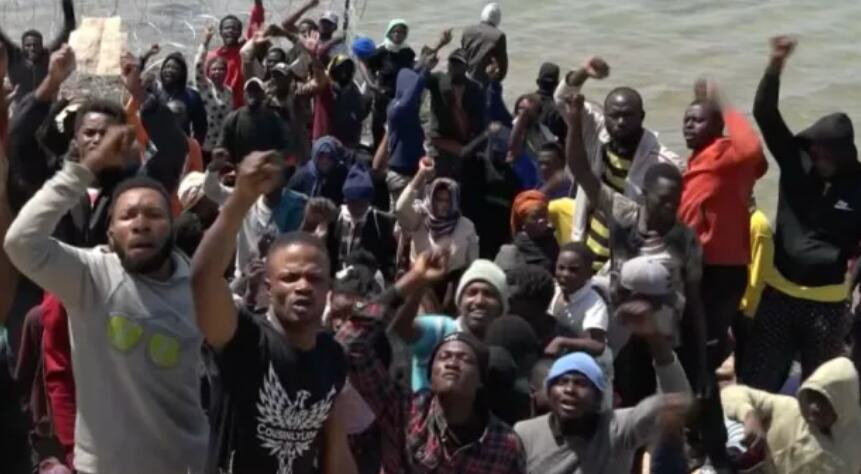Abandoned and Forgotten: Black Refugees Stranded on Tunisia-Libya Border Face Dire Conditions
Black refugees left stranded and facing extreme heat and harsh conditions on Tunisia-Libya border without support or hope, prompting urgent call for humanitarian response.
In a dire and heartbreaking situation, a group of black refugees has been left stranded in a desolate area on the Tunisia-Libya border without any hope or support. These refugees were rounded up by Tunisian security forces in the city of Sfax and transported to this remote buffer zone, where they are facing extreme heat and harsh conditions with no access to healthcare or humanitarian aid.
The hostility towards individuals from sub-Saharan Africa escalated after a Tunisian man died in Sfax, which locals blamed on black refugees. As violence against them increased, these refugees were forced to flee the city.
Three men from Cameroon were arrested in connection with the killing, and hundreds of black refugees were expelled to the border in response to public anger towards undocumented migrants.
Human Rights Watch has condemned the Tunisian government for collectively expelling and mistreating these refugees from sub-Saharan Africa. Lauren Seibert, a researcher at Human Rights Watch, emphasized that these collective expulsions not only violate international law, but they are also morally wrong and inhumane.
Struggling to cope with a large number of asylum seekers, Tunisian authorities have turned against these refugees. President Kais Saeid's statement in February, in which he spoke of a conspiracy to alter the country's racial makeup, fueled racist attacks against black residents, leading them to seek refuge in Europe. Approximately 70 refugees, including women and children, are now trapped in a 10-meter buffer zone they refer to as "point zero."
Among them is Cini Kamada, a pregnant woman from Sierra Leone, who has been stranded in this dangerous border area for a week.
She described the ongoing mistreatment and abuse they face, even at night, leaving her feeling stressed and fearing for the wellbeing of her unborn child. David, another refugee, revealed the harsh treatment they have endured at the hands of Tunisian authorities. He shared their refusal to be pushed back to the border zone, arguing that if the government does not want them, they should have been taken to the UN or their respective immigration offices.
There are two locations where refugees remain stranded on the Tunisian-Libyan border, one on the coast and the other in the middle of the desert a few kilometers to the south. Reporters on the ground have described the conditions as dire, with individuals seeking shelter under trees to escape the scorching heat.
The lack of water, food, healthcare, and shelter has resulted in a tragic loss of life. Ousman Dembely shared the heartbreaking news that his brother, Mousa, had died just two days prior, and his body lay in the desert sun, unable to receive a proper burial.
With hundreds of refugees expelled from Sfax and stranded along the Tunisia-Libya border, their lives hang in the balance. These individuals are in urgent and desperate need of water, food, healthcare, and shelter.
Without immediate assistance, the consequences for these refugees will be dire, leading to further loss of life. The international community must respond swiftly and provide the necessary support to alleviate this humanitarian crisis.




